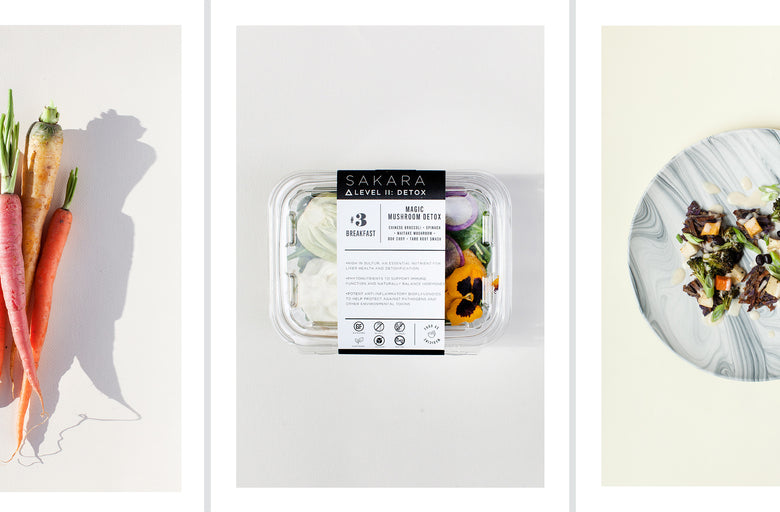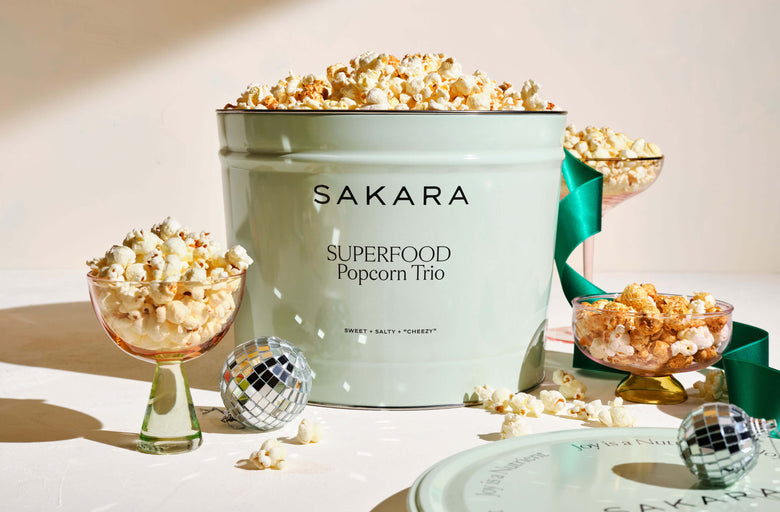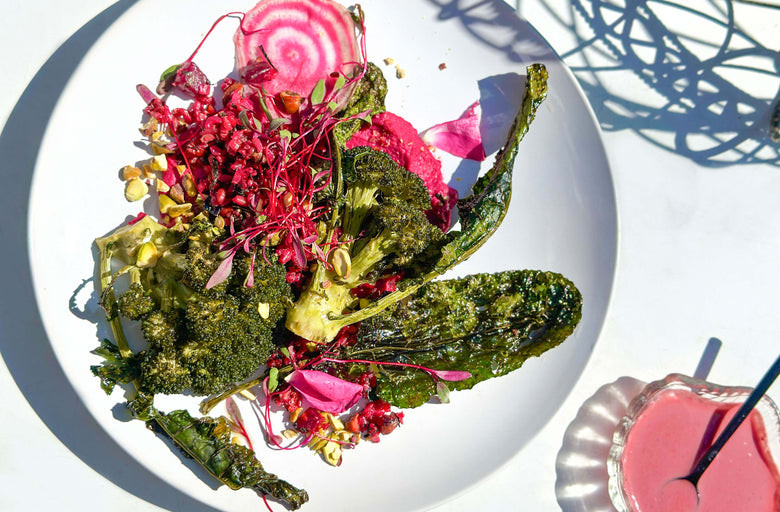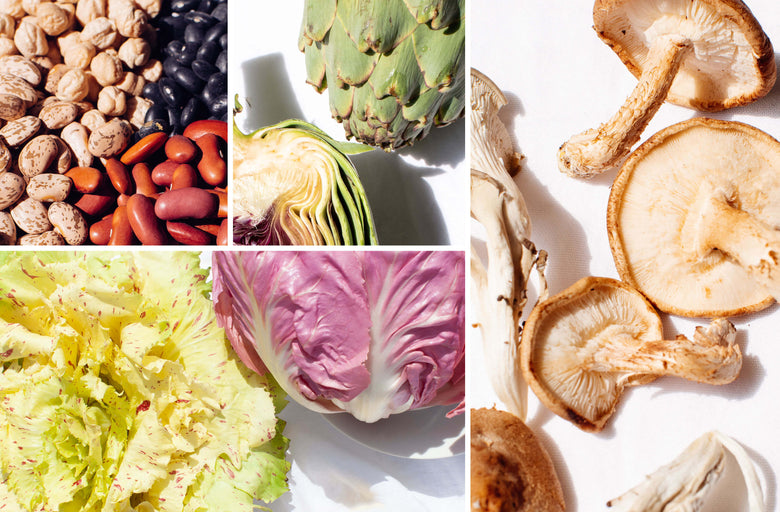Sakara exists at the intersection of science and spirit. Filling our bodies and plates with plants is deeply nourishing to the body and soul—something we know from experience that's been confirmed time and again by the latest research.
Dr. Aviva Romm has been along this journey with us, touting the transformative effects of eating a plant-based diet from the beginning. As a Yale-graduated physician, midwife, and herbalist, she seamlessly blends ancient wisdom with modern science in her practice— and continues to stay rooted in food as medicine. Her understanding of body and fertility synergy was a key reason we tapped her for Level II, our expert-level whole food detox... and we linked up with her yet again to go deeper on why eating enough leafy greens can be a critical tool in creating hormone balance.
Join Dr. Romm (and our other mentors, healers, and friends) for our Plant-Based Challenge and discover for yourself what 14 days of eating exclusively plant-based can do for your mind, body and spirit.
DR. AVIVA ROMM, MIDWIFE, YALE MD, HERBALIST, MOTHER
Why do you personally eat plants?
Plants provide us not just with all of the nutrients our bodies require from macros like protein, carbs, and fat and micros including most essential vitamins and minerals, but they carry within them ancient signaling molecules that as humans, we’ve co-evolved to require for our own cellular health. These phyto-chemicals support natural detoxification, mitochondrial function, protect against inflammation and support immunity. Eating plants also feels good, and as an herbalist, I’m always reminded of my intrinsic connection to the planet, especially when including herbs and spices in my meals, or harvesting plants from my own garden to eat.
How does plant-based eating work with your endocrine system, hormones, and fertility?
Plants support important hepatic detoxification and intestinal elimination functions that help our bodies to maintain appropriate levels of the hormones that support women’s health, including breaking down and eliminating that many endocrine disruptors we’re all exposed to daily that are now known to be associated with PCOS, endometriosis, fertility challenges, and more.
What was the biggest change you've seen in your life when you made nutrition the highest priority?
Healthy eating, both from an ecological and personal ecology perspective, have been my path since I was 15 years old - and I know the amazing health benefits and also young biological age I continue to experience even at 52, have to do with this. When I changed my diet at age 15 (I became a vegan - now I’m more healthy ‘flexitarian’) lifelong allergies and frequent colds because a thing of the past, my mood transformed, and my energy blossomed to whole new levels.
What is your hope for the American diet?
We’re already seeing so much change in how we eat in this country - but only in certain demographics. What we eat impacts our likelihood of developing obesity, chronic disease, and also influences emotional regulation and intelligence. Zip code shouldn’t determine access to healthy food. I’d like this to be a national policy — with better guidance on what truly is healthy.
What's the biggest myth about eating plant-based you'd love to bust?
The biggest myth is there’s one right way of eating. What we need to eat changes with age, which life cycle we’re in, and what we’re engaged in at the time. I went through 3 vegan pregnancies only to absolutely crave and eventually eat meat during my fourth pregnancy. I went back to mostly vegan to hard-core meat eater as a medical student. I’ve worked with many plant-based eaters who had pre-diabetes, fatigue, and hormonal problems because they were relying on sweets and carbs for energy when they weren’t getting enough protein and good quality fats in their diet - which you can do as a plant-based eater. I guess the bottom line is that within plant-based there’s a spectrum of healthy that can include meat (as in plant-based is primarily plants but doesn’t have to exclude meat) and a spectrum of unhealthy where the diet accidentally becomes high sugar because of too many juices and smoothies (which can have as many as 35 grams of sugar each!) and not enough grounding food.
What's always in your fridge/ pantry?
Leafy greens of all sorts— kale, collards, broccolini, bok choy, nappa cabbage— carrots, ginger, berries, wild caught salmon usually twice a week, and in my pantry, almonds, walnuts. My latest obsession that I’m making for my chai or coffee - unsweetened cashew milk.
What are your favorite plant-based dishes/ingredients and why?
In the autumn my two big go-to plant-based dishes are roasted Brussel’s sprouts and roasted root veggies. They’re both incredibly delicious, easy to prep and pop in an oven (you can cook both in the same oven) and between Brussel’s sprouts which are in the same ‘greens family’ as kale and broccoli, and the roasted root veggies, add some great protein and you’ve got a rainbow of a meal that provides healthy phytonutrients, top quality carbs and fiber, and it’s so satisfying.
Dr. Aviva Romm’s Roasted Root Veggies
Serves 4
My family and friends can’t get enough of the roasted root veggie dishes I prepare and they are so elegant when served, giving every meal a rustic feel. For practically no effort. They’re also a fabulous alternative to grain dishes, and still give you a deeply satisfying taste and nourishment. Amazing the next day as leftovers, too, heated up or cold.
Ingredients:
- 3 cups of root veggies cut into big chunks, peeled or unpeeled. Choose from or as I do, use a combination of a few: sweet potatoes, delicotta or butternut squash, parsnips, carrots
- 1 cup of a mixture or either red and yellow onion cut into ‘moons'
- Olive or coconut oil
- Salt and black pepper
- 1-2 tsp mixed herbs— rosemary being my favorite for this dish.
Process:
Cut your veggies into 1-2 inch cubes or for squash, cube or cut into “rings”
Toss in a bowl with the oil, salt, and any herbs you’re using.
Put into a baking tray and bake at 400 for 40-50 minutes.
For softer veggies, start by covering the tray for 30 minutes, then bake uncovered for the remaining time.
The veggies should be tender but not mushy. For slightly drier veggies, spread the mixture over 2 baking trays rather than one.






